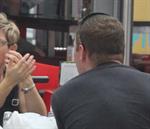Learn to deal with stress related health problems.

- Stress is not just a psychological issue -consider physical as well as mental stress
- Fundamental training for stress management consultants
- Professional development for mainstream medical practitioners and complimentary medical service professionals
- Improve your career, business and personal health potential.
Stress has a major impact on health and well-being.
The ability
to diagnose and manage stress is a huge part of dealing with stress
related health issues. This course helps expand your knowledge and
capabilities in dealing with such issues, and in doing so is a valuable
area of study for anyone who works in the heath industry.
COURSE CONTENT AND STRUCTURE
The course involves six modules and around 600 hours of self paced study. The Core and Elective Modules for the course are listed below; please follow the links in the module titles for more detailed information on the content of each.
Core Modules
These modules provide foundation knowledge for the Certificate in Stress Management.
Elective Modules

In addition to the core modules, students study any 3 of the following 14 modules.
Note that each module in the Certificate in Stress Management is a short course in its own right, and may be studied separately.
A Healthy Body Starts with a Healthy Mind
Psychological research has shown for some years that our immune system is also affected by our mental health.
As stress levels increase our ability to resist infection decreases.
 The immune system defends our bodies against invading microorganisms. It does this through barriers, like mucous membranes, but also by phagocytosis. This refers to the deployment of specialised cells, known as phagocytes, which consume and destroy foreign organisms. After a phagocyte has ingested a foreign microorganism it displays its antigen on the surface of its cell membrane. This antigen is what identifies the cell as foreign or native. If the antigen is foreign, lymphocytes continue the immune reaction.
The immune system defends our bodies against invading microorganisms. It does this through barriers, like mucous membranes, but also by phagocytosis. This refers to the deployment of specialised cells, known as phagocytes, which consume and destroy foreign organisms. After a phagocyte has ingested a foreign microorganism it displays its antigen on the surface of its cell membrane. This antigen is what identifies the cell as foreign or native. If the antigen is foreign, lymphocytes continue the immune reaction.
Lymphocytes are a type of white blood cell. There are two types of lymphocyte – B Cells and T Cells. B cells produce antibodies which go into the fluid surrounding cells to destroy viruses and bacteria, whilst T cells attack viruses and bacteria that get inside a cell. These processes take several days once a new foreign antigen has been recognised. However, if the same antigen is encountered at a later date, the immune response is much faster because there are also memory T and B cells which recognise it. This is how inoculation works.
Stress and the Immune System
Kiecolt-Glaser at al. (1984) carried out an experiment to see whether stress from taking important exams had an impact on the immune system. They took blood samples from 75 medical students one month before their exams. This was considered the “low stress” condition and then they took samples during the exams – the “high stress” condition.
They measured the T cell activity in the blood samples. They also gave the students questionnaires to look at other psychological variables such as other life events. They found that the students had more T cells in their first blood sample (low stress) than in the second blood test (high stress), suggesting that their immune system was not performing so well when they were under stress. They found that the immune system of students who had other stressful life events or psychiatric difficulties, such as depression or anxiety, were more affected and their immune systems were even weaker.
In other research, bereavement has been found to affect the immunological system through reducing T cell functioning. Research by the University of Birmingham found that bereavement can make older people more prone to infections and impair the functioning of their immune system.
They found that older people who had had a recent bereavement had poorer responses to bacteria, so were more vulnerable to infections. They also found that the people who were recently bereaved had imbalances in the stress hormones in their bodies, which affected the body’s ability to fight bugs and infections. It was found these effects were less obvious in younger people, as their immune system seem more resilient, but the impact was greater in older people. They suggested that bereavement is a key stressor and older people who are bereaved should make sure to stay in touch with others socially (family and friends), eat well, and exercise to reduce the impact of the stress and boost their immune system response.
You can enrol on the Certificate in Stress Management at any time. You study by distance learning under the support and guidance of our expert tutors.
If you would like to know more about the Certificate In Stress Management course or have any other questions, please get in touch with our specialist tutors today - they will be pleased to answer your questions.